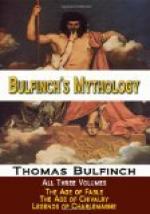[Footnote: Throughout the broad and varied region of romance it would be difficult to find a character of greater simplicity and truth than that of Enid, the daughter of Earl Ynywl. Conspicuous for her beauty and noble bearing, we are at a loss whether more to admire the patience with which she bore all the hardships she was destined to undergo or the constancy and affection which finally achieved the truimph she so richly deserved.
The character of Enid is admirably sustained through the whole tale; and as it is more natural, because less overstrained, so perhaps it is even more touching than that of Griselda, over which, however, Chaucer has thrown a charm that leads us to forget the improbability of her story.]
CHAPTER VIII
PWYLL, PRINCE OF DYVED
Once upon a time Pwyll was at Narberth, his chief palace, where a feast had been prepared for him, and with him was a great host of men. And after the first meal Pwyll arose to walk; and he went to the top of a mound that was above the palace, and was called Gorsedd Arberth. “Lord,” said one of the court, “it is peculiar to the mound that whosoever sits upon it cannot go thence without either receiving wounds or blows, or else seeing a wonder.” “I fear not to receive wounds or blows,” said Pwyll; “but as to the wonder, gladly would I see it. I will therefore go and sit upon the mound.”
And upon the mound he sat. And while he sat there, they saw a lady, on a pure white horse of large size, with a garment of shining gold around her, coming along the highway that led from the mound. “My men,” said Pwyll, “is there any among you who knows yonder lady?” “There is not, lord,” said they. “Go one of you and meet her, that we may know who she is.” And one of them arose, and as he came upon the road to meet her, she passed by; and he followed as fast as he could, being on foot, and the greater was his speed, the further was she from him. And when he saw that it profited him nothing to follow her, he returned to Pwyll, and said unto him, “Lord, it is idle for any one in the world to follow her on foot.” “Verily,” said Pwyll, “go unto the palace, and take the fleetest horse that thou seest, and go after her.”




